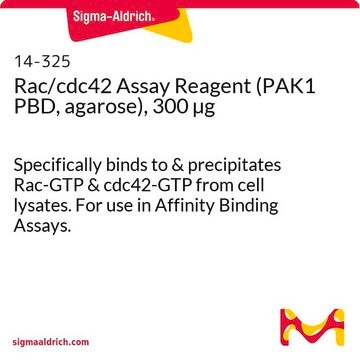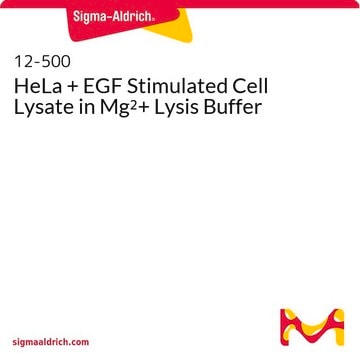14-864
PAK-1 PBD Protein (agarose free), 300 µg
For use in Affinity Binding Assays, ELISA & G-Protein Assays.
Synonym(s):
p21-activated kinase 1, p21/Cdc42/Rac1-activated kinase 1
Sign Into View Organizational & Contract Pricing
All Photos(1)
About This Item
UNSPSC Code:
12352202
eCl@ss:
32160405
NACRES:
NA.32
Recommended Products
biological source
human
Quality Level
mol wt
Mw 21 kDa
manufacturer/tradename
Upstate®
concentration
>50% (Coomassie blue staining, SDS-PAGE)
2 mg/mL
technique(s)
ELISA: suitable
affinity binding assay: suitable (G-protein)
NCBI accession no.
UniProt accession no.
shipped in
wet ice
General description
Product Source: GST fusion-protein, corresponding to the p21-binding domain (PBD, residues 67-150) of human PAK-1, expressed in E. coli.
Quality
Routinely evaluated by G-protein activity assay
Physical form
300 µg of PAK-1 PBD, GST in 150 µL of PBS, pH 7.4, 0.5 mM PMSF, containing 20% glycerol.
Storage and Stability
Stable for 1 year at -20C from date of shipment. For maximum recovery of product, centrifuge the vial prior to removing the cap.
Analysis Note
Specific Activity: Affinity Precipitation Assay: 10 µg of this lot when added with 10 µL glutathione agarose, precipitated Rac-GTP from 3T3 and A431 cell lysates that were loaded in vitro with GTPγS. GDP treated of 3T3 and A431 lysates served as negative controls. Precipitated Rac-GTP was detected by immunoblot analysis using 1 &micor;g/mL anti-Rac (Catalog # 05-389) and secondary goat anti-mouse HRP antibody (Catalog # 12-349) on a Western Blot.
Legal Information
UPSTATE is a registered trademark of Merck KGaA, Darmstadt, Germany
Storage Class Code
10 - Combustible liquids
WGK
WGK 2
Certificates of Analysis (COA)
Search for Certificates of Analysis (COA) by entering the products Lot/Batch Number. Lot and Batch Numbers can be found on a product’s label following the words ‘Lot’ or ‘Batch’.
Already Own This Product?
Find documentation for the products that you have recently purchased in the Document Library.
A X Bigard et al.
European journal of applied physiology and occupational physiology, 76(5), 421-427 (1997-01-01)
We examined the extent of morphological alterations and the myosin heavy chain (MHC) distribution in the rat soleus muscle after a 4-week period of spontaneous recovery or retraining after hindlimb suspension (HS). Moreover, we tested the hypothesis that dantrolene sodium
A Ros-Baro et al.
Proceedings of the National Academy of Sciences of the United States of America, 98(21), 12050-12055 (2001-10-11)
It has been recently reported that insulin recruits a novel signaling machinery to lipid rafts required for insulin-stimulated GLUT4 translocation [Baumann, A., Ribon, V., Kanzaki, M., Thurmond, D. C., Mora, S., Shigematsu, S., Bickel, P. E., Pessin, J. E. &
Shamsideen A Ojelade et al.
PloS one, 10(9), e0137465-e0137465 (2015-09-15)
Responses to the effects of ethanol are highly conserved across organisms, with reduced responses to the sedating effects of ethanol being predictive of increased risk for human alcohol dependence. Previously, we described that regulators of actin dynamics, such as the
V Benard et al.
The Journal of biological chemistry, 274(19), 13198-13204 (1999-05-01)
A major function of Rac2 in neutrophils is the regulation of oxidant production important in bacterial killing. Rac and the related GTPase Cdc42 also regulate the dynamics of the actin cytoskeleton, necessary for leukocyte chemotaxis and phagocytosis of microorganisms. Although
Zhenyuan Xu et al.
International journal of molecular sciences, 22(9) (2021-06-03)
Schwann cells (SCs) are a highly plastic cell type capable of undergoing phenotypic changes following injury or disease. SCs are able to upregulate genes associated with nerve regeneration and ultimately achieve functional recovery. During the regeneration process, the extracellular matrix
Our team of scientists has experience in all areas of research including Life Science, Material Science, Chemical Synthesis, Chromatography, Analytical and many others.
Contact Technical Service








